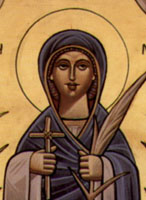Demiana was a young Egyptian woman of remarkable conviction and self-possession. Rejecting the marriage her parents arranged for her, she insisted upon devoting her life to Jesus, eventually persuading her father to build a house in which she and her sisters in faith might live.
Ostensibly a Christian too, her father renounced his faith to avoid persecution by the Roman Emperor Diocletian. Demiana promptly shamed him into another U-turn, whereupon he was beheaded. On learning of Demiana's role in the business, Diocletian ordered that she, too, worship the Roman gods instead, on pain of torture. To no-one's great surprise, this was wholly ineffective.
It is hard to imagine anyone more committed to her faith than Demiana, who sacrificed her father's life and her own rather than bow before the false idols of the Roman gods.
Like most early saints, Demiana wrote nothing that we know of, and left no physical traces in the world. But her story stands as an example of righteousness in the face of persecution, something many subsequent Christians would require.
Saint Demiana enjoyed the rare and dubious distinction of being martyred several times over. A variety of imaginative tortures were applied by her Roman captors, and her broken body was thrown into a cell to die. Returning in the morning, the torturers were amazed to discover Demiana in full health, her wounds cured by the angel Michael. Tiring of this sport, the prince in charge of the interrogation eventually had her beheaded.
Although not recognised as a saint by the Catholic Church, Demiana is one of the best-known and most celebrated female saints of the Coptic Orthodox Church, and is likewise popular within Greek Orthodoxy.














